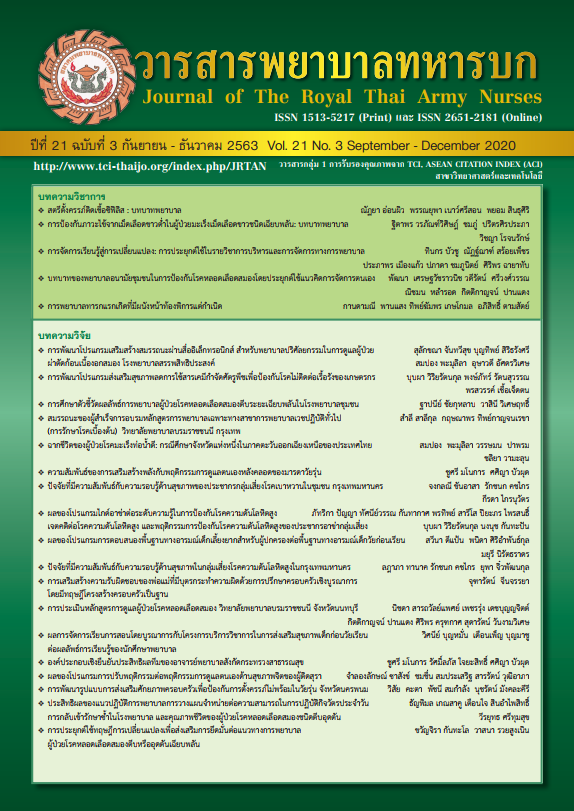The Relationship of Empowerment and Postpartum Self-care Behavior of Teenage Mother
Keywords:
Empowerment, Self-care Behavior, Postpartum Teenage MotherAbstract
The purpose of this research was to study the relationship of empowerment and postpartum self-care behavior of teenage mother. Samples were 100 in postpartum teenage mother by purposive sampling. Research instruments were a demographic questionnaire, the opinion of empowerment in teenage mother, and postpartum self-care behavior of teenage mother which was tested for content validity and reliability. The Cronbach’s Alpha Coefficient of questionnaire was .95. Data were analyzed by using frequency, mean, standard deviation, and Pearson’s product moment correlation.
Findings revealed that the empowerment correlated the postpartum self-care behavior of teenage mother at the most was the nurse ( = 4.22, SD = .75) and the least was the client (
= 3.72, SD = .81). The postpartum self-care behavior of teenage mother was a high level (
= 3.90, SD = .22) at the most was the therapeutic self-care demand (
= 4.25, SD = .74) and the least was the theory of self-care (
= 3.02, SD = .91). The empowerment was positively correlated with the postpartum self-care behavior of teenage mother at statistically significant level of .01. (r = .56).
Downloads
References
Bureau of Reproductive Health, Department of Health. Annual Report 2019. Nonthaburi: Bureau of Reproductive Health Department of Health, Ministry of Public Health. 2019. (in Thai)
Strategy and Planning Division, Ministry of Public Health. Public Health Statistics A.D. 2018. Nonthaburi: Strategy and Planning Division, Ministry of Public Health. 2018. (in Thai)
Oprasertwasdi P, Poipradit W, and Thananipanichkun S. Ramathibodi Obstetrics 2. Bangkok: Holistic Publishing. 1997. (in Thai)
Orem DE. Nursing: Concepts of practice. 4th ed. St. Louis, MO: C.V. Mosby. 1991.
Orem DE. and Taylor S. Case studies in nursing theory. New York: National League for Nursing. 1986.
Choksawadphinyo K. Empowerment-base model for enhancing self-care of persons living with HIV/AIDS. Khon Kaen: Dissertation (Public Health), Khon Kaen University. 2005. (in Thai)
Ratisunthorn J, Thaithae S, and Bowanthammajak U. Effects of empowerment program on breastfeeding behavior and duration of exclusive breastfeeding among adolescent mothers. Kuakarun Journal of Nursing. 2014; 21(2): 139-154.
Chanchaiveraphan M. et al. Effects of empowerment program on breast feeding among adolescent mothers. Journal of Nursing and Health Sciences. 2014; 8(3): 1-13.
Nakrob J. and Surinya T. Empowerment, stress from pregnancy and taking care of children and postpartum self-care behavior of adolescent mothers at Hospital of Department of Medical Services, Ministry of Public Health in Bangkok. Journal of Social Sciences and Humanities. 2012; 38(2): 112-124.
Yamane T. Statistic: An introductory analysis. 3rd ed. New York: Harper & Row. 1973.
Gibson CH. A concept analysis of empowerment. Journal of Advanced Nursing. 1991; 16(3): 354-361.
Vongjinda S. The experiences of first pregnant teenage women. Thesis of Master Nursing (Maternal and Newborn Nursing), Mahidol University. 2003. (in Thai)
Wongniyom K, and Apinuntavech S. The Prevalence and associated factors of depression in teenage pregnancy at Siriraj Hospital. Journal Psychiatric Assoc Thailand. 2014; 59(3): 195-205. (in Thai)
Arundee S. et al. The needs of adolescent mothers for healing and preventing unintended adolescent pregnancy. Social Science Journal Srinakharinwirot University. 2016; 19(1): 276-288. (in Thai)
Taunku C. Promoting family health of adolescent mothers during postnatal period: Applying family nursing process. Thesis of Master Nursing (Family Nursing), Khon Kaen University. 2010. (in Thai)
Zuckerma B, Winsmore G, and Alpert J. A study of attitudes and support systems of innercity adolescent mothers. The Journal of Pediatrics. 1979; 95(1): 122-125.
Mercer RT. The process of maternal role attainment over the first year. Nursing Research. 1985; 34(4): 198-204.
Rappaport J, and Seidman E. Handbook of community Psychology. New York: Kluwer Academic/ Plenum Publishers. 2000.
Oumtanee A. Empowerment in the nursing service system. In the process of organizing academic series for developing the nursing service system potential. Nonthaburi: Sukhothai Thammathirat Open University. 2006. (in Thai).
Rodwell CM. An analysis of the concept of empowerment. Journal of Advanced Nursing. 1996; 23: 305-313.
Jamjuree D. Nursing model for empowerment in chronic disease patients. Bangkok: Sam Charoen Commercial. 2003. (in Thai).
Poomsanguan K. Health empowerment: Nurses’ important role. Journal of The Royal Thai Army Nurses. 2014; 15(3): 86-90. (in Thai)
Gibson CH. A study of empowerment in mother of chronically ill children. Unpublished Doctoral Dissertation. Boston College: Boston. 1993.
Gibson CH. The process of empowerment in mother of chronically ill children. Journal of Advanced Nursing. 1995; 21(6): 1201-1210.
Abdoli S. et al. Religion, faith and the empowerment process: Stories of Iranian people with diabetes. International Journal of Nursing Practice. 2011; 17: 289-298.
Glinnirun P. The effect of empowerment enhancement on self-care behavior of hypertensive patients at Tharongchang Hospital, Phunphin District, Surat thani Province. Journal of Community Health Development Khon Kaen University. 2015; 3(2): 213-230. (in Thai)
Phakoat W, and Thaithae S. The effectiveness of spiritual well-being promoting program on perceived self-efficacy for continuous breast-feeding of teenage mothers at home. Journal of Public Health Nursing. 2013; 27(2): 27-39. (in Thai)
Sullivan AV. et al. Teaching and learning end-of-life care: Evaluation of a Faculty Development Program in Palliative Care. Academic Medicine. 2005; 80(7): 657-668.
Bandura A. Self-efficacy: The exercise of control. New York: W.H. Freeman and Company. 1997.
Downloads
Published
How to Cite
Issue
Section
License
บทความหรือข้อคิดเห็นใดใดที่ปรากฏในวารสารพยาบาลทหารบกเป็นวรรณกรรมของผู้เขียน ซึ่งบรรณาธิการหรือสมาคมพยาบาลทหารบก ไม่จำเป็นต้องเห็นด้วย
บทความที่ได้รับการตีพิมพ์เป็นลิขสิทธิ์ของวารสารพยาบาลทหารบก
The ideas and opinions expressed in the Journal of The Royal Thai Army Nurses are those of the authors and not necessarily those
of the editor or Royal Thai Army Nurses Association.






